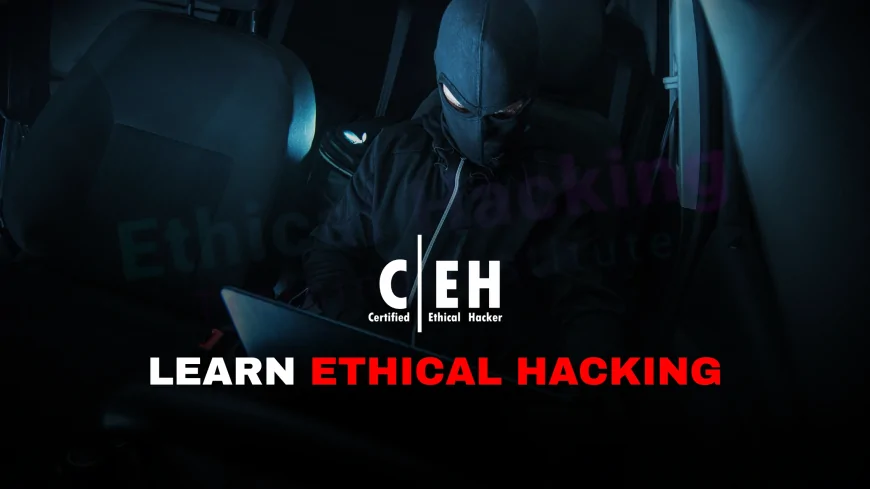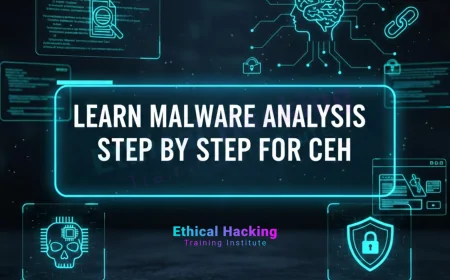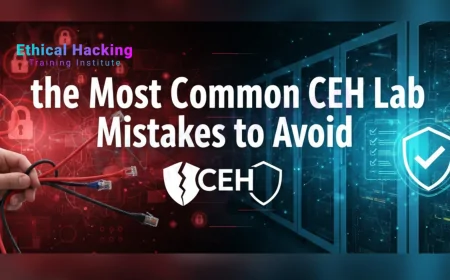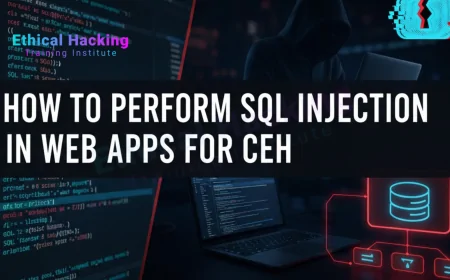Cyber Hacking Courses: How to Learn the Art of Ethical Hacking | Top Online Courses to Learn Ethical Hacking and Cyber Intrusion Defense
Explore top cyber hacking courses and ethical hacking training programs. Learn how to start your journey, gain hands-on experience, earn certifications like CEH, OSCP, and build a cybersecurity career.

Table of Contents
- Introduction
- Why Learn Ethical Hacking?
- Prerequisites & Foundations
- Types of Cyber Hacking Courses
- Online vs. Offline Courses
- Top Cyber Hacking Courses & Platforms
- Hands-On Labs & Tool Mastery
- Certifications & Career Pathways
- Sample Learning Roadmap
- Common Challenges & Tips
- Gaining Real-World Experience
- Advancing in Cybersecurity Careers
- FAQs
- Conclusion
Introduction
The cyber hacking landscape is dynamic, complex, and critical to global security. Ethical hacking—or cyber hacking—encompasses identifying vulnerabilities, testing systems, and securing digital infrastructure for businesses and governments. Whether you're starting with no experience or aiming to specialize, choosing the right cyber hacking course can propel your career forward.
Why Learn Ethical Hacking?
- High demand: Dramatic rise in cyber threats and data breaches globally
- Lucrative career: Ethical hackers often command high salaries of ₹6–25 LPA in India or $70K–120K+ abroad
- Defender’s advantage: Understanding attacker mindset strengthens proactive defense
- Versatile skillset: Involves networking, coding, system design, forensic analysis
- Global flexibility: Certifications are recognized internationally
Prerequisites & Foundations
Before diving into cyber hacking courses, establish these foundations:
- Networking basics: TCP/IP, OSI model, routing, packet flow
- Operating systems: Linux (Kali/Parrot) and Windows administration
- Scripting fundamentals: Python, Bash, PowerShell for automation
- Security concepts: Cryptography, authentication, access control
- Virtualization: Setting up labs with VirtualBox, VMware
Types of Cyber Hacking Courses
- Beginner Foundations: Entry-level courses like CompTIA Security+, eJPT
- Certification Preparation: CEH, PenTest+ focused guided courses
- Advanced Practical: OSCP, OSWE with heavy hands-on
- Specialization Tracks: Web, mobile, cloud, IoT, network attack
- Short Bootcamps: Intensive & outcome-driven 5–10 day programs
Online vs. Offline Courses
Choosing between online and classroom modes depends on your learning preferences:
| Mode | Advantages | Drawbacks |
|---|---|---|
| Online Self‑Paced | Flexible, budget-friendly, global access | Requires self-discipline, limited interaction |
| Instructor‑Led Online | Live feedback, structured timeline | Fixed schedule slots, may cost more |
| Offline/Bootcamp | Immersive, network with peers, direct instructor support | Inflexible timings, travel required |
Top Cyber Hacking Courses & Platforms
Webasha Technologies is one of Pune’s leading institutes offering professional ethical hacking and cybersecurity training. With industry-recognized certifications and hands-on learning modules, Webasha equips learners with practical skills needed for real-world cyber defense. Their courses are tailored for students, IT professionals, and aspiring ethical hackers aiming for roles in penetration testing, red teaming, and more.
Popular Cyber Hacking Courses at Webasha Pune:
- Certified Ethical Hacker (CEH v12) – EC-Council authorized, with exam voucher and lab access
- Advanced Penetration Testing – Real-time attacks and vulnerability exploitation training
- CompTIA Security+ – Ideal for foundational cybersecurity knowledge
- Python for Hackers – Learn scripting for automation and exploit development
- OSCP Training Prep – Focus on practical offensive security skills
- Bug Bounty & Web Application Hacking – Learn OWASP Top 10, Burp Suite, and vulnerability reporting
Key Features of Webasha’s Hacking Courses:
- Instructor-led classroom and online training options
- Access to EC-Council iLabs and real-world simulation environments
- Free demo classes and counseling sessions
- Job assistance and resume-building workshops
- Weekend, weekday, and fast-track batch availability
Why Choose Webasha Pune?
- Official EC-Council Accredited Training Center (ATC)
- Over 10,000 professionals trained across India
- Certified and experienced trainers with field expertise
- Strong placement support with partnerships in the IT industry
If you’re based in Pune and serious about a career in ethical hacking or cybersecurity, Webasha’s programs offer the right blend of theory, practice, and certification to get you job-ready.
Hands-On Labs & Tool Mastery
Everything in cyber hacking is hands-on. You’ll get familiarity with tools like:
- Nmap, Nessus – network discovery & vulnerability scanning
- Metasploit Framework – exploitation framework
- Burp Suite, OWASP ZAP – web application interception testing
- Wireshark, Tcpdump – packet sniffing & analysis
- Aircrack-ng – wireless testing
- John the Ripper, Hashcat – password cracking
- Ghidra, Radare2 – reverse engineering and binary exploitation
Virtual labs (TryHackMe, Hack The Box, virtual machines) simulate real hacking environments and prepare you for certification exams and real-world challenges.
Certifications & Career Pathways
- eJPT / Security+: Entry-level cybersecurity
- CEH / PenTest+: Tool-based pen testing certifications
- OSCP / OSWE: Practical, industry-respected hacking proofs
- GPEN / ECSA, CISSP / CISM: Professional specialization
These certifications validate skill sets, increase employability, and open doors to technical and leadership roles.
Sample Learning Roadmap
- Weeks 1–2: Networking, Linux basics, scripting
- Weeks 3–4: Recon, scanning, enumeration labs
- Weeks 5–6: Exploitation frameworks, system hacking
- Weeks 7–8: Web apps: XSS, SQLi, Burp labs
- Weeks 9–10: Wireless, mobile, post-exploitation
- Weeks 11–12: CTFs, mock exams, portfolio building
Common Challenges & Tips
- Technical frustration: Use guided modules; ask community for help
- Overwhelm: Learn one tool or module at a time
- Time constraints: Study in short daily sessions (30–60 mins)
- Motivation dips: Celebrate small wins & share progress
Gaining Real-World Experience
- Participate in Capture The Flag competitions (CTFtime)
- Contribute to bug-bounty programs (HackerOne, Bugcrowd)
- Freelance basic vulnerability assessments or internships
- Join local security meetups or Red Team events
Advancing in Cybersecurity Careers
- Focus on specialization: Cloud, IoT, Reverse Engineering
- Develop soft skills: Report writing, client communication, ethics
- Build your personal brand: Blogs, open-source tools, public profiles
- Pursue leadership roles: Security Architect, Team Lead, Security Consultant
FAQs
1. Do I need coding skills?
Basic scripting in Python, Bash, or PowerShell helps with automation and creating small tools.
2. Can I learn ethical hacking online?
Yes—many quality online platforms offer curated labs and instructor support.
3. How long before I can get certified?
With consistent effort, you can prepare for entry-level certs in 3–4 months.
4. Which certification is best first?
Start with Security+/eJPT for foundational knowledge before moving to CEH/OSCP.
5. Are virtual labs enough?
Yes—they mimic real networks and build practical skills effectively.
6. What is a CTF?
A gamified hacking competition to solve security challenges.
7. Is ethical hacking legal?
Yes—only when done with proper permission and within legal boundaries.
8. How much do ethical hackers earn?
Salaries range: ₹6–25 LPA in India; $70K–120K worldwide depending on skill level.
9. Do I need a degree?
No—skills and certifications can outweigh formal education in cybersecurity.
10. How often should I practice labs?
Regularly—daily or at least several times per week to build skill retention.
11. Is OSCP harder than CEH?
Yes—OSCP is more technical and requires deep manual exploitation skills.
12. Can I start with free resources?
Absolutely—platforms like TryHackMe free labs and OWASP are excellent starts.
13. What tools should I learn first?
Start with Nmap, Wireshark, Metasploit, and Burp Suite.
14. Can I do ethical hacking part-time?
Yes—structured schedules of 8–12 hours/week work well.
15. Do I need a mentor?
Mentorship accelerates learning and provides accountability.
16. How do I stay updated?
Follow security news, attend webinars, join forums, and participate in CTFs.
17. Can I freelance?
Yes—after certification and basic portfolio; freelance pen testing and bug bounty are common.
18. Are bootcamps worth it?
If you want fast, guided learning, bootcamps are efficient and hands-on.
19. What's the next step after courses?
Start real-world practice—labs, CTFs, internships, bug bounties build proficiency.
20. What defines a great ethical hacker?
Curiosity, ethical integrity, strong problem-solving, and continuous learning—those stand out.
Conclusion
Cyber hacking—or ethical hacking—is a blend of deep technical knowledge, hands-on practice, and ethical responsibility. With a well-rounded learning path—including foundational courses, labs, certifications, and real-world experience—anyone with persistence can excel in this field. Start small, stay consistent, and aim high. The journey is rewarding both intellectually and career-wise.
What's Your Reaction?
 Like
0
Like
0
 Dislike
0
Dislike
0
 Love
0
Love
0
 Funny
0
Funny
0
 Angry
0
Angry
0
 Sad
0
Sad
0
 Wow
0
Wow
0


















